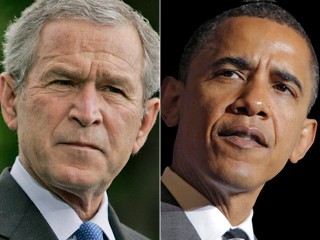Nation still polarized as 47% blame Bush and 45% blame Obama for the Great Recession

As the Great Recession drags on, voters continue to view the origin of the economic crisis in stark, partisan terms. In a recent Rasmussen Reports poll, 47% of likely voters believe the policies of George W. Bush are the primary cause of the nation's current financial predicament, while 45% of likely voters believe President Obama's policies are largely to blame.
Men primarily blame the current recession on Obama, while women primarily blame it on Bush. In addition, the majority of Democrats blame the economic crisis on the Bush administration, while the majority of Republicans blame it on the Obama administration. Independents are closely divided.
So, what's new?
Democrats are blaming Republicans, Republicans are blaming Democrats, and Independents are blaming both. In the meantime, the national debt is exploding, effective (U6) unemployment is at 16.6%, Wall St is down 26% from its 2007 high, a record number of Americans are on food stamps, hundreds of banks are failing, and homeowners continue to foreclose at a record pace.
How did we get here?
I submit that the Great Recession is largely a product of the "Bush-Obama" doctrine. Both administrations, as well as Republican and Democratic Congresses, have enacted a number of similar policies since 2001. They include:
- extensive tax cuts; while Bush's tax cuts are legendary, under Obama, 47% of Americans did not have to pay federal taxes this year
- significant increases in domestic spending; Bush especially ramped up spending in Medicare, Education, and Homeland Security, while Obama has boosted domestic spending in virtually every category
- significant increases in war spending; Bush launched wars in Afghanistan and Iraq, while Obama has further increased military spending and expanded the War on Terror
- "stimulus" programs; Bush launched two stimulus programs, one largely composed of tax cuts and the other (2008) composed of generous government checks, while Obama launched the unprecedented $787 billion program in 2009
- corporate bailouts; Bush and Obama supported the $700 billion bank bailout and both administrations pumped hundreds of billions into Fannie Mae, Freddie Mac, AIG, GM, Chrysler, etc.
- loose monetary policy at the Federal Reserve; Bush and Obama have supported dovish Federal Reserve chairmen, who many economic experts believe are highly responsible for creating the stock, credit, and housing bubble by instituting artificially low interest rates over long periods of time
While there are some critical differences between the style and priorities of the Bush and Obama administrations, their core policies have proven virtually identical. The same holds true for Congress during this period, whether Republican or Democrat.
So, while the blame game rages on, the policies don't change all that much. Instead, deficits grow, debt skyrockets, the Dollar loses value, Wall St is bailed out, war remains open-ended, and the economy struggles.
Perhaps the time has come for Americans to kick the "two-headed, one-party monster" to the curb and start looking elsewhere for meaningful change.




